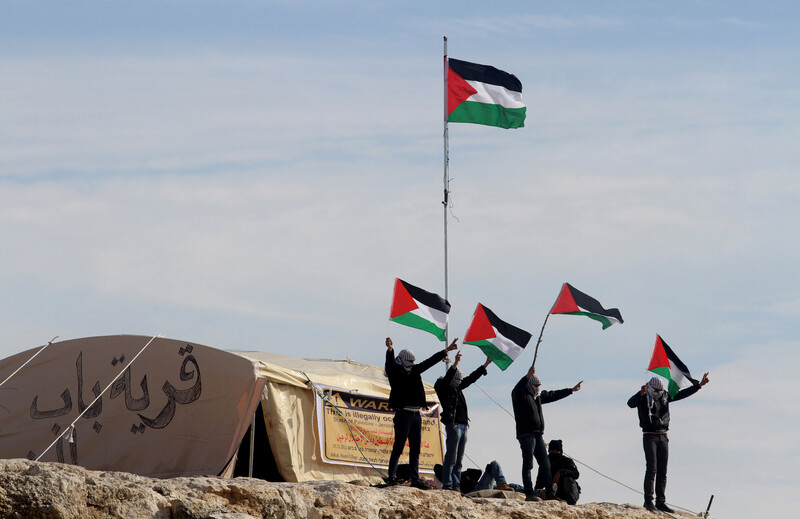The Electronic Intifada 15 January 2013

The establishment of Bab Al Shams is a direct action against Israel’s settlement enterprise.
APA imagesA group of local activists, Palestinian and international, informed me of a protest camp we would set up to help community members in Jericho and give support to the surrounding areas. We were told to be prepared to face armed Israeli soldiers. But even so, the instructions were vague. None of us knew exactly where we were going.
At 5am on Friday morning, 11 January, 50 activists took a bus to an area we called Bab Al Shams. One of the group leaders of the camp told us that we were on private Palestinian land termed by Israel as “E-1.” Israel was planning on constructing settlements here, he told us, and our mission would be to camp out in defiance of the occupation forces.
He told us that we were all informed that we would be heading to Jericho, but this was only meant to keep the plan as secretive as possible. “If you’d like to stay, you can. If not, we understand, and you can return with the buses,” he told us after explaining the risks associated with what we would soon be doing.
We started to build tents. After a few hours, four more busloads of activists arrived at the scene. Together, we erected even more tents. By noon, after finishing with the tents, we held Friday prayers for the first time in Bab Al Shams.
Eviction notices
Not long after, we were met by Israeli border police and soldiers who arrived at the location to hand out eviction notices to the residents of this new village. Bab Al Shams, having been founded just hours earlier, had already posed a risk to the Israeli government. The police threatened to return and demolish the tents shortly if we didn’t take them down ourselves. Needless to say, we stood our ground.
Luckily, we had already been prepared for such an occasion. We petitioned against the threatened demolitions to the Israeli high court which then issued a warrant delaying any eviction or demolition for six days. The court would use this time to further assess the situation there. It is important to remember, though, that Bab Al Shams was erected on private Palestinian land.
So there it was. The village of Bab Al Shams with a Palestinian flag standing tall at the highest point of the village.
Lockdown
But the village was quickly put under lockdown. Nothing was going in and nothing went out. We were short on mattresses, blankets and food. Everybody understood the situation and shared whatever they could with one another.
The night was cold and people were freezing in their beds. Thank God for the paramedics who were on site to help us. We also our own security guards in the village who stayed up all night protecting everyone and making sure nothing happened. Bab Al Shams was looking more and more like a village.
The second day, a little after noon, some of the activists who were feeling unwell made the decision to return home for treatment and rest. They walked to the nearest streets where Israeli occupation forces quickly escorted them away from Bab Al Shams. But at the same time, another hundred or so activists arrived from another set of buses to bolster our presence. They brought with them supplies and helped renew our spirits in the cold weather.
Encircled
As the population grew in size, so did the imminent threat of an Israeli raid designed to stop all activity in Bab Al Shams. At 11pm on Saturday, more than 500 Israeli forces — soldiers and police — surrounded the village. We could see them approaching from all sides as they aimed their bright lights at us.
The armed Israeli forces climbed the hillside up to us and completely encircled us. They were ordering us to leave. Many of the activists tied themselves to the tents. Others put their hands together and sat down in the middle of the small village while chanting in Arabic, “With soul, with blood, we’ll protect Palestine.”
We were outnumbered. Plus, we could see the soldiers burning various items in the village. Soon enough the Israeli forces began their assault on us specifically. Everyone in the village was rounded up and arrested. Many were hit with the butts of Israeli weapons. Others, including myself, were dragged through the sand and dirt and thrown back onto buses.
The buses started their engines about an hour after they were filled. We didn’t know where we were going but we assumed we were going to an Israeli prison.
But we later found that Israeli hummers were escorting the buses to the Qalandia checkpoint, where we were greeted by other Palestinians and activists in high spirits. We had made history with Bab Al Shams and we continue to refuse to let Israeli construct settlements on Palestinian land.
Abbas Sarsour is a 21-year-old Palestinian from Ramallah currently living in the United States. He is active in various student and community organizations dedicated to Palestinian rights. He can be followed on Twitter at @iFalasteen.


